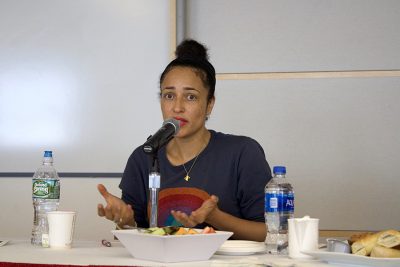
Zadie Smith entered the room and took her seat, unnoticed.
Tuesday morning, the Colloquium Room of Boston University’s Photonics Center filled slowly with students and professors. Attendees gathered for a breakfast and conversation with Smith to discuss her 2016 novel “Swing Time,” which was longlisted for the Man Booker Prize in 2017, and has been included in various BU class curricula and read by campus book clubs.
At the breakfast, Smith, who has written multiple critically acclaimed novels, short stories and essays, and currently teaches creative writing at New York University, answered questions from BU students about everything from her personal experiences as a young biracial girl in London to her advice to young writers.
“If you’ve written a good book, you can kick it through the door like a football and it would be published,” Smith told The Daily Free Press.
Smith said the idea for “Swing Time” came from thinking about her own experiences growing up in the housing projects of Northwest London and the peers she left behind. Born in 1975, Smith described her generation as one obsessed with celebrity, and said she considers her own fame as both a privilege and a weapon.
“When I was growing up — not that it was perfect — but there were safety nets, many,” Smith said during the talk. “And I went to Cambridge for free — you can’t do that [in the U.S.] Those kinds of differences are not trivial. But we’re becoming more like you.”
The novel’s narrator, who goes unnamed throughout the story, works as an assistant to a pop superstar. At one point, the two travel to an unnamed West African country to build a school, but the project fails, highlighting one of the novel’s main themes.
“The fact is that fame is still power,” Smith said to the The Daily Free Press. “And it extends not only to individuals but to countries — the issues for countries like Gambia is that [they’re] not famous, and to be not famous … is to suffer and to be ignored and to be sidelined and to be marginalized.”
Carrie Preston, director of the Kilachand Honors College at BU, moderated the morning’s conversation and worked with Kilachand faculty to focus this semester’s Honors College freshman writing studio around “Swing Time.”
“She’s writing about problems that are of great contemporary relevance … most crucially about race and gender, about an increasingly globally interconnected world and how young people — and in this case a young mixed race woman — finds her way in that world,” Preston said, in an interview with The Daily Free Press.
Smith does not focus on literary idols. Everything inspires her, she said, and usually paintings and music are actually the most impactful.
“It doesn’t have to be the olden, famous … it can be, like, if a new novel comes on my door by a new writer, if it’s good, then I’m inspired by that,” Smith told The Daily Free Press. “It’s everybody, all the time. I have a new art crush every week.”
Smith began work on her first novel, “White Teeth,” at 19 years old. Five years of work later, the novel was published in 2000, when Smith was 24. She said she’d write from 9 a.m. to 6 p.m. because she did not yet have a family or a “real job.”
“I always say to young writers, ‘Look, your main concern is not the structural publishing issue — that will become your problem later — the main concern in front of you is to write well, which is way harder than any kind of agent,” Smith told The Daily Free Press.
James Johnson, a history professor at BU, led the South Campus book group while they read “Swing Time” this semester. He has been spearheading the new series “Conversations in the Arts and Ideas,” which brought Smith to campus.
“Zadie Smith is the embodiment of so much of what we hope to do with this series — she is a fresh voice [and] she writes about issues that define our own world — issues of identity, issues of roots, issues of race, issues of celebrity, technology and globalized media,” Johnson said.
A key component of the program will be integrating artists’ works into BU class curricula, Preston said. In Kilachand, for example, faculty hosted screenings of movies and music mentioned in “Swing Time” so that students had a more holistic understanding of the novel’s pop cultural and historical context.
“I would just say that there’s a real hunger at BU for an event like this to bring in major figure in arts and ideas and to have this kind of programming surrounding the event that many units at BU, including Kilachand, were able to provide,” Preston said.
Johnson hopes students will be inspired by Smith’s humility and honesty. Rachel Schlueter, a senior in the College of Arts and Sciences, certainly was.
“She made it pretty clear that … you can only talk so much about how you actually sit down and write, but the topics of discussion actually gravitated toward what I thought was one of the most eloquent perceptions of what’s going on today,” Schlueter said. “She’s just lovely. I just want to be around her.”




